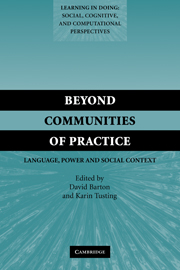
-
Select format
-
- Publisher:
- Cambridge University Press
- Publication date:
- November 2009
- October 2005
- ISBN:
- 9780511610554
- 9780521836432
- 9780521544924
- Dimensions:
- (228 x 152 mm)
- Weight & Pages:
- 0.55kg, 258 Pages
- Dimensions:
- (228 x 152 mm)
- Weight & Pages:
- 0.346kg, 258 Pages
You may already have access via personal or institutional login
Book description
The concept of 'communities of practice' (Lave and Wenger 1991, Wenger 1998) has become an influential one in education, management, and social sciences in recent years. This book consists of a series of studies by linguists and educational researchers, examining and developing aspects of the concept which have remained relatively unexplored. Framings provided by theories of language-in-use, literacy practices, and discourse extend the concept, bringing to light issues around conflict, power, and the significance of the broader social context which have been overlooked. Chapters assess the relationship between communities of practice and other theories including literacy studies, critical language studies, the ethnography of communication, socio-cultural activity theory, and sociological theories of risk. Domains of empirical research reported include schools, police stations, adult basic education, higher education, and multilingual settings. The book highlights the need to incorporate thinking around language-in-use, power and conflict, and social context into communities of practice.
Contents
Metrics
Altmetric attention score
Full text views
Full text views help Loading metrics...
Loading metrics...
* Views captured on Cambridge Core between #date#. This data will be updated every 24 hours.
Usage data cannot currently be displayed.
Accessibility standard: Unknown
Why this information is here
This section outlines the accessibility features of this content - including support for screen readers, full keyboard navigation and high-contrast display options. This may not be relevant for you.
Accessibility Information
Accessibility compliance for the PDF of this book is currently unknown and may be updated in the future.


